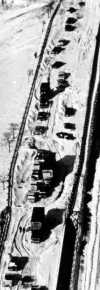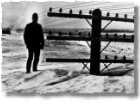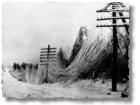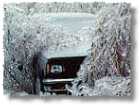
 Winter Storms
Winter Storms
Severe storms in winter can cause the usual wind-related damage such as toppling power lines and trees but the extra risk from
extreme cold makes winter snow storms very dangerous. A power outage accompanied by very cold termperature creates a life threatening situation for everyone without a backup heat source. Snow accumulation can paralyze traffic of all kinds, stopping emergency response and transporting of supplies. You may be isolated for days depending on your location.
A winter storm of freezing rain can cause severe damage to power lines and trees, as well as making travel impossible.
The majority of actual deaths from ice and snow occur in automobile accidents on treacherous roads. Most other deaths are people caught out of shelter during the storm. So, the most important thing to do when a winter storm approaches is to get inside and off the road.
Follow these tips to survive a snow blizzard or storm whether you are outside, at home, or in a car...
 Caught Outside
Caught Outside
- Find or Make Shelter
- Wait in any old building
- Dig a snow cave
- Take cover in a stand of brush or trees
- Stay Dry
- Cover all exposed body parts
- Wear a warm hat to conserve body heat.
- Keep your mouth covered with a scarf to protect lungs from bitter cold air.
- Do not exert yourself to prevent sweating and chills and breathing cold air too deeply.
- Build a fire and keep it burning
- Do NOT eat snow. Melt it and warm it up first.
 At Home
At Home
The most probable scenario is that you are at home when a severe snow storm hits. You heard about it coming on the news and decided to stay home until it passes. Now, as long as you are prepared, everything will be just fine as long as you make smart decisions:
- Keep water faucets running a tiny amount to help prevent pipes freezing.
- Lower temperature to 60-65 to conserve fuel.
- Wear many layers of loose, lightweight clothes. Add or remove layers to stay comfortable but not too warm.
- Consider having an alternate heat source such as kerosene heater, and fuel.
- If heat fails:
- Close all unneeded rooms.
- Keep shades drawn and hang plastic, sheets, or blankets over windows and doors to slow heat loss.
- Have everyone stay together in a couple rooms for shared warmth.
- Have everyone wear warm hats to conserve body heat.
- If electricity fails, use caution with candles to prevent a house fire.
- Follow other power outage guidelines.
- Eat healthy food and drink water from you normal supplies or emergency supply as needed. Your body needs food energy to produce heat.
- Know where the main water valve shut-off is in case your pipes do freeze and crack.
 On The Road
On The Road
-
Winter Car Items - keep these in your car, especially in winter.
- emergency car kit
- Folding shovel
- windshield scraper
- Tow rope
- 20 pounds of sand
- Spare gas container
- Spare blanket
- 2 large garbage bags
- Have your battery checked before freezing weather hits.
- Check your heater before you need it.
- Change your oil and filter so you have appropriate cold weather oil.
- Fill up the gas when it gets below 1/2 full. Never get stuck without gas.
- Assume overpasses are frozen even if the road is not.
- Make gradual changes in speed and direction - no sharp turns or acceleration.
- Take time to clear your windows before driving.
- Keep extra room between you and the car ahead.
- If you get stuck,
- Tie a bright cloth to the antennae
- Stay with your car - do not venture out unless tied by rope to your car.
- Run the motor for ten minutes every hour for heat.
- Move your arms, legs, fingers, and toes to keep blood circulating and warming them.
- Eat a handful of GORP or other some high energy food every hour to keep your body generating heat.
- Drink 1/2 cup of water every hour.
- Do not use lights or radio when engine is off or the battery will drain.
- When the storm passes, raise the hood to indicate help is needed.
Winter Driving Tips - increase your chances by being ready and making good choices.

Find Emergency and Disaster Info at www.EmergencyDude.com

